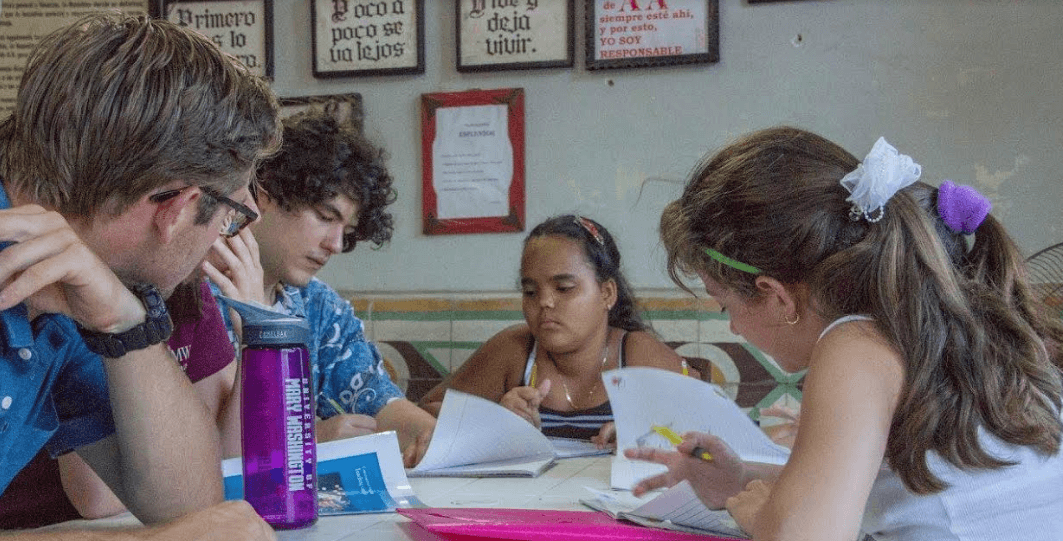UMW students visit Cuba for first time ever this summer
3 min read
Sean Ingraham, Cassi Tomiko, and Ben Purdy work with Cuban children on their English skills. (Christina Eggenberger | The Blue & Gray Press)
By GARY KNOWLES
Staff Writer
This past June University of Mary Washington students spent a couple weeks with Cuban citizens. This was the first time that UMW students have been allowed to travel to Cuba. There are still travel and commercial restrictions surrounding travel from America to Cuba, but the organization called Global Volunteers was able to make this trip possible. The program was led by the director of service, Christina Eggenberger, alongside Dr. Golda Eldridge with the Center for Honor, Leadership and Service.
The service projects directed by the UMW program were affiliated with a church in Ciego de Avila and supported the Cuban people as a humanitarian People-to-People program.
A People-to-People program promotes ambassador programs for cultural exchange, including programs for students to engage with citizens of another country. Eggenberger said, “We were in Cuba on religious visas since our community projects were affiliated with a church.”
Students had the opportunity to engage in a variety of activities on the trip, which included helping Cuban locals develop their English language skills, working with locals in community gardens, refreshing community buildings, sewing with local Cuban women to benefit women’s cooperative interests, making meals for senior citizens and visiting the capital Havana.
John Cronin, a junior political science major, explained how different the landscape of Cuba was. “[There was] a lot of beautiful art made out of old scraps of metal or other pieces of trash,” said Cronin. “It was really cool to see how they can do more with less.”
Sean Ingraham, a junior history major, pointed out how different Cuba was in terms of the internet use.
“In the United States, we take [the internet] for granted, having instant access whenever we want,” he said. “When any of us wanted to use the internet [in Cuba], you had to purchase a card with a code on the back… With this code, you logged onto their internet and you only had an hour of use before it would kick you off.”
The differences in perspective proved to be beneficial for all people involved.
“There were so many bonds formed while we were there,” said Eggenberger. “We exchanged email addresses and now have Facebook friends in Cuba.”
Ingraham told the story of his experience teaching Hotel California to a young guitarist, Carlos, on his ukulele. He talked about how the pair played the song using each other’s different instruments. Ingraham said, “This was a first-hand experience that music transcends all cultural and language barriers.”

Cronin offered insight into the experience.“Just because our governments disagree with each other doesn’t mean that the people have any animosity towards us,” said Cronin.
Until recently, American travel to Cuba was not allowed. However, due to the Obama administration’s changes to policy, American citizens may now travel to Cuba if they meet certain criteria.
The organization knew how to work around the travel limitations, according to Eggenberger, but it required students to journey to Cuba on a series of commercial flights from Washington, D.C. to Miami and Miami to Santa Clara.
According to the U.S. Embassy website, travel from the United States to Cuba needs to fall into a specific category for the visit to be authorized. Some of the reasons for visiting are family visits, U.S. government business visits, business of a foreign government, journalistic activity, professional research, educational activities, religious activities, public performances, clinics, workshops, athletic or other competitions, humanitarian projects, exportation, importation, and transmission of information or informational materials are authorized. Tourist activities are still prohibited under statute.
Anyone interested in having an immersive experience in another country, whether to learn new information or form bonds with local communities, should check out the Center for International Education’s web page on the UMW website. Upcoming trips include the Winter Break trips to Nepal and South Africa. The trips focus on civic engagement and sustainability issues respectively.











